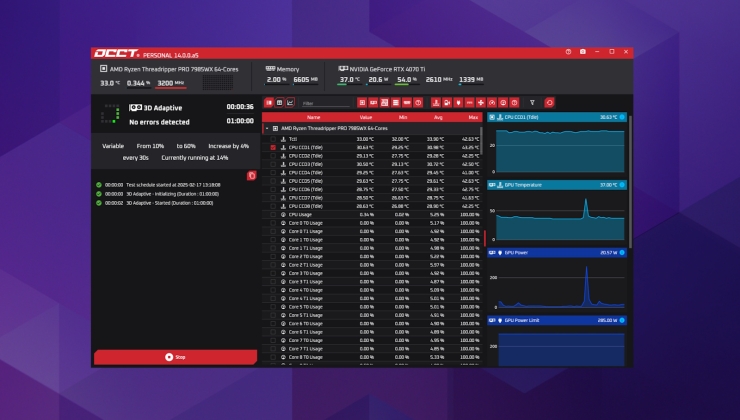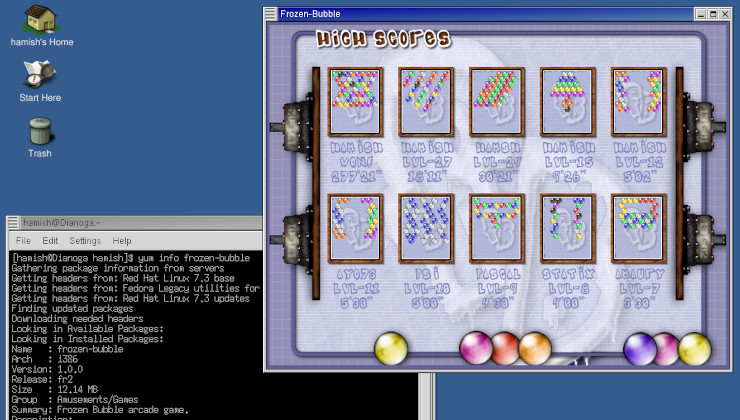It was likely no secret to most Linux users who know a bit about distributions but Valve has clarified directly that the main reason for dumping Debian Linux for Arch Linux was for faster updates.
Previous versions of SteamOS were based on Debian which has a fresh release every 2 years or so, where during that time most of the software stack is frozen in place. For a Linux gaming device, that's obviously not ideal. Gaming on Linux as a whole often needs more up to date packages because everything moves so quickly. Especially for Steam Play Proton, which has at multiple times needed updates to various packages and newer GPU drivers. Arch Linux on the other hand rolls over constantly with updates and so it gives Valve the flexibility they're needing to more easily pull them in.
PC Gamer, one of the lucky few who recently went to the Valve HQ spoke to Valve designer, Lawrence Yang:
"So, Arch Linux, one of the main reasons, there's a couple, but the main reason is the rolling updates of Arch allows us to have more rapid development for SteamOS 3.0," says Yang. "We were making a bunch of updates and changes to specifically make sure that things work well for Steam deck, and Arch just ended up being a better choice for them."
Valve upgrades the Steam Client constantly and no doubt they will be doing the same with SteamOS 3 once the Steam Deck actually rolls out. Having finer control over everything that they would get with Arch Linux is basically a no-brainer, as is the huge availability of software that comes with Arch and the AUR (Arch User Repository), something that will be a big boon for the desktop mode.
It's not likely that SteamOS 3 will just plainly update directly from Arch though, as that could end up messy. They will likely bundle updates together once they've been firmly tested. More like a Manjaro approach but with more clear QA done.
Spoiler, click me
Anyway I do respect most distros, and totally understand versions-release scheme match use cases, it just doesn't fit me.
My guess: Because Canonical can't decide what it wants with the desktop. Trying to remove the 32bit libs was a boneheaded move.
I am very happy that Valve is using KDE for the desktop mode!
As a Debian user I guess I should be disappointed by them choosing Arch. But why? We should celebrate open platforms. The lack of vendor lock in, and how easy it is to move from one distro to another!
AFAIK the main Linux developer at Valve doesn't like Debian's package format.
If that's true, then I don't think it's worth discussing any other reasons. This one is the only one that matters :P
Would be interesting to know the details on that however since it doesn't make any sense.
AFAIK the main Linux developer at Valve doesn't like Debian's package format.
If that's true, then I don't think it's worth discussing any other reasons. This one is the only one that matters :P
Would be interesting to know the details on that however since it doesn't make any sense.
Still waiting for someone to jump in and show the source...
Debian is, at it's core, a rolling distribution. It is interrupted every two years by a few months long freeze period when the release happens. But that is meant for servers and enterprise environments, where stability is paramount. If you want bleeding edge, you just keep on rolling.
The simple truth is that a lot of technology choices are quite arbitrary, and are very often based on personal preferences. We talk about the best tool for the job, and like to compare things to each other. But often they are not better or worse, just different.
Even though I am a Debian fanboy, I think what Valve is doing is very cool, and I will happily run SteamOS/Arch on my Steam Deck. Although I am going to replace KDE with GNOME, because of course you would.
Debian is not perfect, but lack of updates is not the reason why they switched. At least not the way you think.
Debian is, at it's core, a rolling distribution. It is interrupted every two years by a few months long freeze period when the release happens. But that is meant for servers and enterprise environments, where stability is paramount. If you want bleeding edge, you just keep on rolling.
The simple truth is that a lot of technology choices are quite arbitrary, and are very often based on personal preferences. We talk about the best tool for the job, and like to compare things to each other. But often they are not better or worse, just different.
Even though I am a Debian fanboy, I think what Valve is doing is very cool, and I will happily run SteamOS/Arch on my Steam Deck. Although I am going to replace KDE with GNOME, because of course you would.
I'm not sure if this was intended to be a response to my post, but let me clarify.
Even Debian Sid is not usually as up to date (especially when it comes to graphics drivers) as Arch. Also, it is in my experience more trouble to manage a Sid installation than it is to manage an Arch installation (of course Debian stable is one of the easiest distributions to manage of all, but that's not relevant here). Sid is intended for experimentation/development of upcoming stable versions of Debian, while Arch is intended to be used by people who like to live on the bleeding edge. Either one could be used as a basis for Steam OS of course, but Arch is likely to be a better fit for Valve's purposes. That's not to say it isn't a close call.
AFAIK the main Linux developer at Valve doesn't like Debian's package format.
If that's true, then I don't think it's worth discussing any other reasons. This one is the only one that matters :P
Would be interesting to know the details on that however since it doesn't make any sense.
Still waiting for someone to jump in and show the source...
I found this old mentioning, but not the original...
["Jean Loup Griffais has said they were a bit tired of using the debian tools."](https://www.phoronix.com/forums/forum/phoronix/general-discussion/1108129-valve-will-not-be-officially-supporting-ubuntu-19-10?p=1108166#post1108166)
Last edited by Eike on 12 Aug 2021 at 7:50 am UTC
This is basically what I read into 'we switched to Arch'. While PKGBUILDs are easy... that means PKGBUILDs can be created by anyone... and uploaded by anyone. Frankly I think/hope they disable AUR by default (like Arch Linux does) and only people who know how to break/fix their systems should dink with it. AUR is by it's nature an 'untrusted' source.If that's the case, how come they didn't decide to use Debian Testing instead?
AFAIK the main Linux developer at Valve doesn't like Debian's package format. While I'm on Debian's side, I don't care too much which one they use.
The other thing is, when Valve first started building SteamOS based on Debian, they did not have debian-backports being part of the main (supported) repositories. Now they are (and have been since buster). This easily allows kernels, mesa, drivers, etc to be updated safely. Or you know, they could maintain just their own single repository with packaged stuff that gets downloaded. But yeah, the developer doesn't like Debian's package format.
That's okay, I'll be putting Debian on mine anyhow :P And I bet the overall experience will be the exact same.
I dumped Fedora for Manjaro because of the Anaconda installer. I don't know what it is but that installer hates me and the feeling is mutual, quite frankly.Ha, that Anaconda installer is trash (the GUI one). It is fine for automation purposes.
AFAIK the main Linux developer at Valve doesn't like Debian's package format.
If that's true, then I don't think it's worth discussing any other reasons. This one is the only one that matters :P
Would be interesting to know the details on that however since it doesn't make any sense.
Still waiting for someone to jump in and show the source...
I found this old mentioning, but not the original...
["Jean Loup Griffais has said they were a bit tired of using the debian tools."](https://www.phoronix.com/forums/forum/phoronix/general-discussion/1108129-valve-will-not-be-officially-supporting-ubuntu-19-10?p=1108166#post1108166)
It was in one of the git commits or something for SteamOS? I can't remember where it was, but I know the post they are referring to. As I remember thinking 'yeah, .debs are kind of annoying to package, but just find one of the debian maintainers and have them do it...'
The question no-one is asking: Why not an Ubuntu base?Back when they based the original SteamOS on Debian, it was because of Canonical's Creative... something license, I can't recall off the top of my head what it was called, but the discussion was basically about that.
My guess: Because Canonical can't decide what it wants with the desktop. Trying to remove the 32bit libs was a boneheaded move.
I am very happy that Valve is using KDE for the desktop mode!
Back when they based the original SteamOS on Debian, it was because of Canonical's Creative... something license, I can't recall off the top of my head what it was called, but the discussion was basically about that.
Interesting. I am surprised the Canonical stuff wasn't something that could have been stripped out. I wasn't thinking Valve would use vanilla Ubuntu. Whether or not it would have worked, I can see Valve's desire not to be relying on a commercial Linux distro, that has a very different agenda than theirs.
I mean Ubuntu is basically Debian, but forked and 'ruined' from a philosophical standpoint. Going for a non-corporate backed distribution makes a lot of sense from the perspective Valve was coming from.Back when they based the original SteamOS on Debian, it was because of Canonical's Creative... something license, I can't recall off the top of my head what it was called, but the discussion was basically about that.
Interesting. I am surprised the Canonical stuff wasn't something that could have been stripped out. I wasn't thinking Valve would use vanilla Ubuntu. Whether or not it would have worked, I can see Valve's desire not to be relying on a commercial Linux distro, that has a very different agenda than theirs.
Think the issue was Ubuntu licence meant that valve corpnwould have to pay or partner with conical and that was never going to happen.Some of the things happened after Valve had already gone with Debian, but lets recap weird things we've heard Ubuntu / canonical do over the years.
1) talk about dropping 32bit
2) forcing packages to be installed from their own snap repos instead of deb packages or others (even going so far as to make 'apt install chromium' install the snap.)
3) they used to (still do?) Enable experimental hardware support in their kernels.)
4) work on Unity instead of devoting development effort toward Gnome.
5) work on Mir instead of devoting development time to Wayland.
I am sure there are more.
Think the issue was Ubuntu licence meant that valve corpnwould have to pay or partner with conical and that was never going to happen.Some of the things happened after Valve had already gone with Debian, but lets recap weird things we've heard Ubuntu / canonical do over the years.
1) talk about dropping 32bit
2) forcing packages to be installed from their own snap repos instead of deb packages or others (even going so far as to make 'apt install chromium' install the snap.)
3) they used to (still do?) Enable experimental hardware support in their kernels.)
4) work on Unity instead of devoting development effort toward Gnome.
5) work on Mir instead of devoting development time to Wayland.
I am sure there are more.
Oh yeah I remember the amazon deal they had too but and i know debian does too but ubuntu has a large commerical arm well large in terms of linux commerical arms and valve chosing them after battering microsoft for closed wall eco system and that forced snap packages is the linux version of that.
Oh yeah I remember the amazon deal they had too but and i know debian does too but ubuntu has a large commerical arm
What is Debian doing too??
Ha, the only thing I've ever seen Debian ASK to do, is the popularity contest during the install. I recall a few years ago someone was making a stink about it like it was new, and claimed it was some telemetry thing for advertising. It literally just sends a thing saying 'these packages are installed' and if more people enabled them, they could tell which packages should get more support.Oh yeah I remember the amazon deal they had too but and i know debian does too but ubuntu has a large commerical arm
What is Debian doing too??
Makes me wonder if Ubuntu maybe used that information to determine what is in main vs universe / multiverse nonsense? Another reason I like Debian over Ubuntu. The repositories actually make sense and aren't some random thing about what is chosen to be a supported package or not.










 How to set, change and reset your SteamOS / Steam Deck desktop sudo password
How to set, change and reset your SteamOS / Steam Deck desktop sudo password How to set up Decky Loader on Steam Deck / SteamOS for easy plugins
How to set up Decky Loader on Steam Deck / SteamOS for easy plugins
See more from me